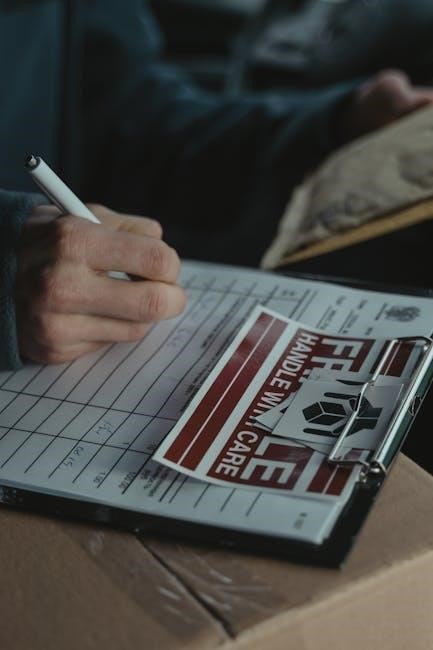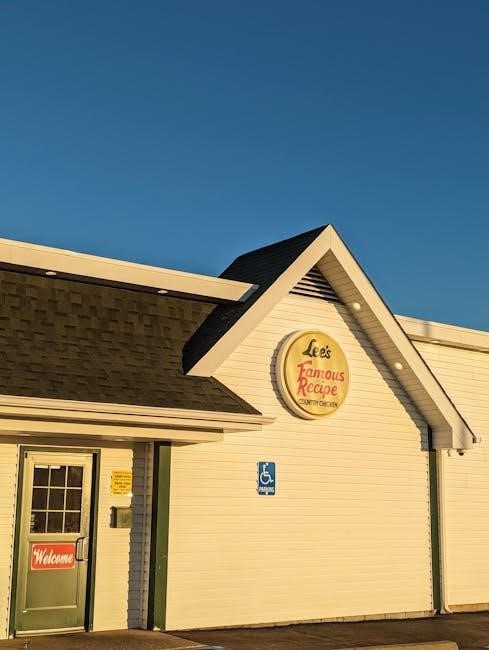The Missouri Commercial Driver’s Manual, published by the Missouri Department of Revenue, provides essential guidance for CDL applicants, covering safety inspections, license fees, and testing processes. It serves as a crucial resource for understanding federal and state regulations, ensuring drivers are well-prepared for the responsibilities of operating commercial vehicles.
Overview of the Manual’s Purpose and Structure
The Missouri Commercial Driver’s Manual is designed to help CDL applicants prepare for written and skills tests. It is structured to cover essential topics such as CDL general knowledge, combination vehicles, air brakes, and safety regulations. The manual is divided into sections for clarity, ensuring drivers understand federal and state requirements. It is available as a PDF download and serves as a primary resource for safe and compliant commercial driving in Missouri.
Importance of the Manual for CDL Applicants
The Missouri Commercial Driver’s Manual is the primary study guide for CDL applicants, offering detailed information on state and federal regulations. It ensures drivers understand safety standards, vehicle inspections, and operating procedures. By following the manual, applicants can prepare effectively for written and skills tests, ensuring compliance with Missouri’s commercial driving laws and promoting safe driving practices.

Eligibility Requirements for a Commercial Driver’s License (CDL) in Missouri
To qualify for a CDL in Missouri, applicants must meet age, residency, and medical certification requirements. Additional criteria include passing background checks and completing mandatory training if applicable.
Age and Residency Requirements
In Missouri, CDL applicants must be at least 21 years old to operate a commercial vehicle across state lines. For intrastate driving, applicants can be 18 years old. Residency is verified by providing proof of Missouri residency, such as a utility bill or lease agreement. Applicants must also be U.S. citizens or lawful permanent residents. Certain offenses, like felony convictions, may disqualify candidates. Proper documentation is required to confirm eligibility.
Medical Certification and Physical Requirements
CDL applicants in Missouri must meet strict medical standards. A medical certification from an FMCSA-certified examiner is required. The examination assesses physical fitness, vision, and health. Certain conditions, such as epilepsy or poor vision, may disqualify applicants. Drivers must carry a valid medical examiner’s certificate. Renewal of certification is mandatory, typically every 2 years. Failure to comply can result in license suspension. Regular health monitoring ensures road safety and compliance with federal regulations.
Application and Testing Process for a CDL
The CDL application and testing process in Missouri involves submitting required documents, passing written and skills tests, and completing a physical exam. The manual guides candidates successfully.
Step-by-Step Application Process
To apply for a CDL in Missouri, candidates must first verify eligibility and gather required documents, such as proof of identity and residency. Next, complete the application form and submit it to the Missouri Department of Revenue. Pay the applicable fees and undergo a mandatory physical exam to obtain medical certification. Finally, pass the written knowledge test to receive a Commercial Learner’s Permit (CLP) before scheduling the skills test. The manual outlines these steps in detail.
Written and Skills Tests for CDL
The CDL process includes a written knowledge test and a skills test. The written test covers traffic laws, safety rules, and vehicle inspection procedures. Candidates must also pass a skills test, which includes pre-trip inspections, basic vehicle control, and on-road driving. The Missouri Commercial Driver’s Manual provides detailed study material for both tests, ensuring applicants are well-prepared. A Commercial Learner’s Permit (CLP) is required before taking the skills test, and additional endorsements may require specialized exams.
Endorsements and Restrictions for Commercial Licenses
Commercial licenses in Missouri may include various endorsements such as HazMat, Passenger, or Tanker, each requiring specific tests. Restrictions, like air brake or automatic transmission limitations, are applied based on driver performance and vehicle type. The manual details how to obtain or remove these, ensuring drivers operate within their certified capabilities.
Types of Endorsements Available
Missouri offers several CDL endorsements, including HazMat (hazardous materials), Passenger (transporting people), Tanker (liquid or gas cargo), and Doubles/Triples (pulling multiple trailers). Each endorsement requires specific knowledge and skills tests. The CDL Manual details these options, ensuring drivers understand the requirements for operating specialized vehicles and cargo, helping them choose the right endorsements for their career goals in the trucking industry.
Understanding Restrictions on CDL
CDL restrictions are limits placed on a driver’s license based on driving history, vehicle type, or specific violations. Common restrictions include air brake limitations or prohibitions on double/triple trailers. Certain convictions, like reckless driving or DUI, can lead to disqualifications. Drivers must adhere to these restrictions to maintain their CDL eligibility. The Missouri CDL Manual outlines these rules, helping drivers understand how to avoid violations and ensure compliance with state and federal regulations while operating commercial vehicles.

Safety Inspections and Vehicle Maintenance
The Missouri CDL Manual emphasizes pre-trip and post-trip inspections to ensure vehicle safety. Regular maintenance of tires, brakes, and lights is critical to prevent mechanical failures and enhance road safety.
Pre-Trip and Post-Trip Inspection Procedures
The Missouri Commercial Driver’s Manual outlines detailed pre-trip and post-trip inspection procedures to ensure vehicle safety. Drivers must check tires, brakes, lights, mirrors, and the tractor-trailer connection before and after trips. These inspections help identify potential issues, preventing accidents and ensuring compliance with regulations. The manual emphasizes the importance of documenting findings and addressing any defects before operating the vehicle, promoting a culture of safety and accountability on the road.
Importance of Regular Vehicle Maintenance
Regular vehicle maintenance is critical for ensuring safety, efficiency, and compliance with regulations. The manual stresses that proper upkeep reduces the risk of mechanical failures, preventing accidents and downtime. Drivers must adhere to maintenance schedules, monitor vehicle condition, and address issues promptly. This practice not only prolongs the vehicle’s lifespan but also contributes to safer roadways and operational efficiency, aligning with Missouri’s commitment to public safety and regulatory standards.
CDL Skills Test Requirements
The CDL skills test evaluates a driver’s ability to operate a commercial vehicle safely. It includes pre-trip inspections, basic vehicle control, and on-road driving skills, ensuring competence behind the wheel.
Components of the Skills Test
The CDL skills test in Missouri consists of three main parts: pre-trip inspections, basic vehicle control, and on-road driving. The pre-trip inspection evaluates the driver’s ability to identify and report vehicle defects. Basic vehicle control tests maneuvering skills, such as backing and parking. The on-road portion assesses safe driving habits in real traffic conditions. Each component ensures the driver demonstrates competence and safety in operating a commercial vehicle.
Tips for Passing the Skills Test
To pass the CDL skills test, thoroughly review the Missouri Commercial Driver’s Manual and practice regularly. Conduct detailed pre-trip inspections to identify vehicle issues. Master basic vehicle control maneuvers like backing and parking. Stay calm and focused during the on-road driving portion, adhering to traffic laws. Consider enrolling in a formal training program for professional guidance. Arrive early and ensure all documents are in order to avoid delays.

License Fees and Costs Associated with CDL
The Missouri CDL manual outlines the fee structure for applications, with additional costs for endorsements and skills tests, ensuring transparency for applicants.
Fee Structure for CDL Applications
The Missouri CDL manual details a clear fee structure for applications, including the base application fee, additional costs for endorsements, and fees for required skills tests. The manual outlines the total costs for different types of CDLs, ensuring applicants understand the financial investment. It also provides guidance on payment methods and where to find the most up-to-date fee information through the Missouri Department of Revenue.
Additional Costs for Endorsements and Tests
Beyond the base CDL application fee, applicants may incur additional costs for specific endorsements and required skills tests. The manual outlines fees for endorsements like HAZMAT or tanker vehicles, as well as potential charges for multiple testing attempts. These costs are detailed to help applicants budget appropriately. The Missouri Department of Revenue provides the most accurate and up-to-date fee information for all CDL-related expenses.
Medical Requirements for Commercial Drivers
Commercial drivers must meet FMCSA medical certification standards, as outlined in the manual. Regular medical exams ensure drivers are physically qualified to operate commercial vehicles safely.
FMCSA Medical Certification Process
The FMCSA medical certification process ensures commercial drivers meet federal physical qualification standards. Drivers must undergo regular medical exams conducted by FMCSA-certified examiners. The process includes a review of medical history, vision, blood pressure, and physical abilities. Certification is required to operate commercial vehicles safely and legally. Drivers must carry a valid medical card, with renewals typically every 1-2 years, depending on health conditions.
Disqualifying Medical Conditions
Certain medical conditions can disqualify individuals from obtaining a CDL. These include severe vision or hearing impairments, uncontrolled diabetes, epilepsy, or heart conditions. Drivers must meet FMCSA standards, and some conditions may require additional documentation. A medical examiner evaluates whether a driver’s health meets federal regulations, ensuring safe operation of commercial vehicles. Disqualifying conditions are determined based on their potential to impact driving ability and public safety.

Traffic Laws and Safe Driving Practices
The Missouri Commercial Driver’s Manual outlines traffic laws and safe driving practices to ensure compliance and reduce risks. It emphasizes defensive driving, speed limits, and proper signal use.
Missouri Traffic Laws for Commercial Vehicles
Missouri traffic laws for commercial vehicles emphasize safety and compliance. Speed limits are strictly enforced, with specific restrictions for commercial vehicles. Drivers must adhere to hours of service regulations and ensure proper load securement. The manual outlines penalties for violations, such as overweight fines and logbook discrepancies. Additionally, CDL holders are held to higher standards, including a lower blood alcohol limit of 0.04%. Understanding these laws is crucial for safe and legal operation of commercial vehicles in Missouri.
Safe Driving Techniques for Commercial Drivers
The Missouri Commercial Driver’s Manual emphasizes defensive driving and awareness to ensure road safety. Techniques include maintaining safe following distances, managing speed according to road conditions, and using mirrors effectively. Drivers are taught to anticipate hazards, such as sudden stops or pedestrian actions, and to handle emergencies like brake failures. Proper load distribution and vehicle control are also stressed to prevent accidents and ensure safe cargo transport.
Commercial Learner’s Permit (CLP) Information
The Commercial Learner’s Permit (CLP) allows applicants to practice driving a commercial vehicle under supervision. Eligibility requires a valid Missouri driver’s license, passing required knowledge tests, and completing a vision test. The CLP is a prerequisite for obtaining a CDL and is valid for 180 days.
How to Obtain a CLP
To obtain a Commercial Learner’s Permit (CLP) in Missouri, applicants must meet eligibility criteria, including being at least 18 years old and providing proof of Missouri residency. They must pass a vision test, complete all required knowledge tests, and submit the necessary documentation. Once these steps are completed, applicants can submit their application and pay the associated fees. The CLP is valid for 180 days and allows supervised practice driving. Additional details are outlined in the Missouri Commercial Driver’s Manual.
Restrictions and Requirements for CLP Holders
CLP holders in Missouri must be supervised by a qualified CDL holder when operating a commercial vehicle. They are restricted from carrying passengers or hauling hazardous materials. The CLP is valid for 180 days and cannot be renewed. Holders must adhere to all traffic laws and maintain a clean driving record. The permit allows practice driving in specific vehicle types only, as outlined in the Missouri Commercial Driver’s Manual.
Resources and Training for CDL Applicants
The Missouri CDL Manual and approved training programs provide essential resources for applicants, ensuring they acquire the necessary skills and knowledge for safe commercial driving.
Recommended Training Programs
Formal training programs are highly recommended for CDL applicants, as they provide hands-on experience and expert instruction. These programs cover topics outlined in the Missouri CDL Manual, including safety inspections, vehicle maintenance, and regulations. They also offer practical skills training, such as handling large vehicles and navigating complex road conditions. Completing a certified program significantly improves readiness for the CDL skills test and ensures a strong foundation for a career in commercial driving.
Additional Resources for CDL Preparation
Beyond the manual, CDL applicants can access online resources, such as practice tests and study guides, to enhance their preparation. The Missouri Department of Revenue offers downloadable PDF versions of the Commercial Driver License Manual for convenient study. Additionally, websites like dor.mo.gov provide updated information on testing processes, medical requirements, and endorsement details, ensuring applicants are well-informed and prepared for their exams.

